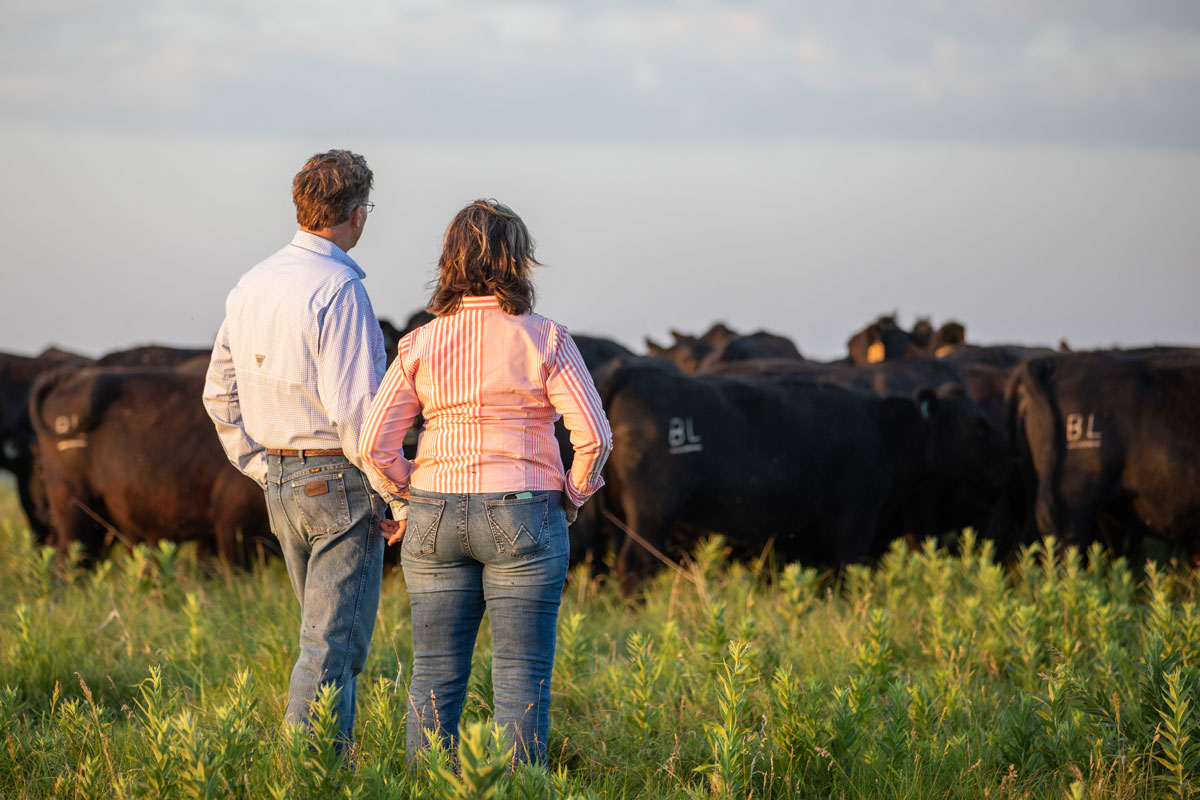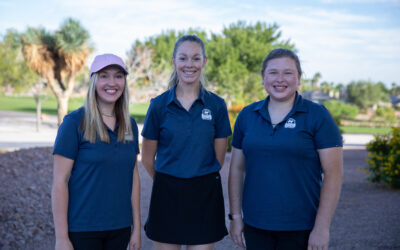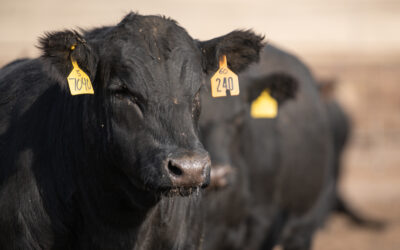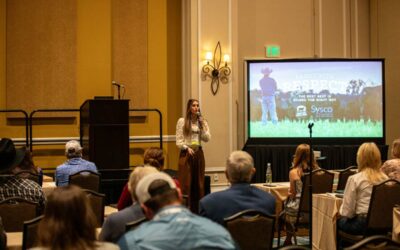
Progress, Not Perfection
Kansas farm family earns the 2022 CAB Progressive Partner Award.
By Kylee Kohls Sellnow
Most know her as an advocate for agriculture. Countless farmers and ranchers respect her as an enlightened Angus breeder. Many call her a friend, neighbor and mentor.
She will ask you to just call her “Debbie.”
Debbie Lyons-Blythe works alongside her family in the Kansas Flint Hills to raise the best beef, paving the way for a more sustainable beef supply. They do it one breeding decision, management practice, farm tour and conversation at a time.
“Cattle producers and consumers, we are all vitally important to the progress of our environment, the progress of animal welfare and the progress of making sure our businesses are profitable,” she says.
Working toward a better beef business earned Blythe Family Farms the 2022 Certified Angus Beef Progressive Partner Award.
Kids and Cattle
It’s a labor of love, obvious in the way she lights up explaining their family’s 33-year effort to proactively adapt Angus cows to their land.
A lifetime of telling stories from the pasture or kitchen has resonated with nonfarm consumers as much as fellow ranchers.
“Everything we do is about cattle, but it’s also about family and connecting our kids to the land and to the cattle,” Debbie says.
The three boys have all moved back home, bringing a diversified skillset to support their family legacy.
Trenton works fulltime on the farm and runs Level Creek Outfitters, a guided pheasant hunting operation with his wife Brier. Selling agriculture equipment during the week for a local manufacturer, Eric and his wife Cece spend evenings and weekends helping on the farm. Similarly, Tyler works fulltime with agriculture technology and equipment for the local co-op by day and farms with his family in any spare time. The Blythe sisters’ careers have taken them out of Kansas, but they’re still co-owners in the farm.
“My parents taught me it didn’t matter if you were a guy or a gal, the work needs to be done,” Debbie says. “Meghan and Allie’s commitment to the farm, alongside their brothers, has helped build the operation.”

(left to right) CAB President John Stika, Jeff Cather, CAB EVP Production Bruce Cobb, Allie Cather, Tyler, Duane, Debbie, Trenton, Brier, Eric, Cece Blythe, Lance and Meghan Shriver

Planning Ahead
Succession plans aren’t what everyone talks about at the table with their 20-something children and spouses. But it is a frequent topic at a Blythe Sunday dinner.
Duane lost his father when he was 14 and decided to take on management of the family’s farm. It resulted in more lessons learned the hard way than he cares to count – and the realization he never wanted his children to feel that way.
Looking at the couple, anyone might assume Duane and Debbie have many more able years ahead, but they’re already in the process of transitioning the farm to their five children.
“With the opportunity of our family and our children working together, I’d like to think we’ve helped them, at least at this point, to overcome a lot of those challenges and created an opportunity for them to learn the best practices from us,” Duane shares. “Certainly, they’re going to find ways to build a better fence down the road, but they’re not going to make the same mistakes that I made.”
He chuckles at the memory of the first fence he built and knows how much quicker and stronger that fence would be if it were built with the help of his boys today.
“They make us all look better, but it’s been a fun ride for Debbie and me to raise our family and to pass on the information we’ve been able to acquire over time with them,” he says.
Part of that transition kit includes a computer file with photos of pastures, plants and notes on weather patterns and dates Debbie worked on for years. She says it’s easy to reference the grazing management plan when they have questions on when to move cattle or to control-burn a pasture.
The forward-thinking model helps all of them find opportunities to make the farm better.


Numbers Don’t Lie
The Blythes rely on history and data to make improvements.
“Progress is difficult to define without a measurement, without the ability to compare to a baseline and show how much change we’ve made,” Debbie says. “We’re not making any more land. We have to be able to utilize this land in such a way that it will raise more food. We have to follow best-management practices and make sure we are doing a better job with what we have, to see progress.”
This mindset shifted the family’s purebred Angus operation to what it is today: 175 registered cows, 225 commercial Angus females and a 375-head commercial Angus heifer development program.
With the rich native grass resource, they decided 17 years ago their time, skills and resources would be best spent in a commercial heifer program.
They start with about 450 females each fall.
“We typically purchase heifers from families with cattle that have genetics we know,” Debbie says. “I prefer that they be weaned and preconditioned with two shots and bunk broke. That’s not always possible, so we’re willing to do the work, but we’ve found that the longer we own them, the better those heifers settle to AI.”
The first cull factor? Temperament.
“We pay attention to how they enter the chute, how calm they are, how they gather,” Debbie says. “We just don’t keep anything that has a bad disposition.”
They collect data throughout the year to decide which heifers stay.
In January, they work with a veterinarian to get a pelvic measurement score and identify the shape of the pelvis, serving as a preliminary sort for females that will perform with longevity.
Debbie and her sons artificially inseminate (AI) as many as they can for February 1 calves. She’s proven her simple breeding program: one shot of Lutalyse followed by 10 days of heat detection.
“I spend a lot of time walking through those heifers, teaching them how we work around them, making sure that they’re not afraid of people on foot,” Debbie says. “And by the end of those 10 days, I can do anything I need with those heifers by myself.”
After the heifers have been AI’d once to a proven sire, they are sent to native grass pastures with Blythe Angus bulls for 60 days, targeting a tight calving interval.
Debbie uses an EPD (expected progeny difference) benchmarking system she’s created to identify ideal matings: birth weight, weaning weight and marbling are priorities.
“We rely heavily on genomics when we’re selecting bulls,” she explains. “I believe strongly in carcass EPDs, especially marbling. If the hot new bull doesn’t have a good marbling score, I won’t use him. I just feel like it’s my responsibility to be able to create good beef.”
Her bull customers rely on her decisions, too.
Many have commercial herds and retain ownership of their calves, but they leave the EPDs to Debbie. Making sure they meet both cattle customer and beef consumer demands, the Blythes often retain ownership on their own calves at Tiffany Cattle Company.
Their last pen sold in 2021 graded 97% Choice or Prime, with 90% making CAB or CAB Prime.
Just more data pointing to progress, if not quite perfection.


A Sustainable Future
Debbie and Duane decided early on that it was important to communicate and connect with people that want to know who raised their food.
“When we had the first opportunity to host a tour with Certified Angus Beef, we jumped at the chance,” Debbie says. “We work very hard to not only host people on the ranch, but also to stay connected with them.”
The cattle business as we know it today is only sustainable if there’s demand for high-quality beef. And healthy, productive land to raise it on.
“I’m proud of our family for being open and connected to various organizations over the years,” she says. “I believe that my involvement in the U.S. Roundtable for Sustainable Beef is what will make it possible for my kids to farm and ranch in the future.”
Today, she serves as the organization’s 2022-23 chair, helping to define sustainability across the beef supply chain.
“To me, sustainability is taking care of the land, taking care of the animals, taking care of the people and making money,” she says. “Every farmer and rancher is committed to those things. That’s nothing new. But now we are able to measure and communicate more clearly along the entire beef value chain through involvement on the Roundtable from both Certified Angus Beef and farms and ranches like Blythe Family Farms.”
Similarly, Trenton’s outfitting business adds another tier of sustainability to the farm’s available resources.
“The cattle and farming business go hand in hand with the outfitting,” he explains.
The open winter pastures and cover-cropped farmland make hunting migratory and upland birds feasible all season.
Along with making the land healthier and diversifying revenue streams, cattle care is a part of the Blythe’s long-term sustainability.
“Beef Quality Assurance certification is vital when talking about sustainability,” Debbie says. “If you ask a consumer, ‘What is sustainability?’ For the most part, they say ‘animal welfare.’ So, we want to be able to prove we are trained in the best way to handle cattle.”
Tools, data and continuing education give the couple confidence their legacy will be around for another 100 years.
“Angus cattle are vital to the future of Blythe Family Farms,” Debbie says. “My kids are going to make a lot of decisions that are different from what I’ve made, but I really believe they will continue to have black cattle on this land.”
Originally published in the Angus Journal.
You May Also Like…
$100,000 Up for Grabs with 2024 Colvin Scholarships
Certified Angus Beef is offering $100,000 in scholarships for agricultural college students through the 2024 Colvin Scholarship Fund. Aspiring students passionate about agriculture and innovation, who live in the U.S. or Canada, are encouraged to apply before the April 30 deadline. With the Colvin Scholarship Fund honoring Louis M. “Mick” Colvin’s legacy, Certified Angus Beef continues its commitment to cultivating future leaders in the beef industry.
Carcass Quality Set to Climb Seasonally
With the arrival of the new year the beef market will rapidly adjust to changes in consumer buying habits. This will remove demand pressure from ribs and tenderloins, realigning the contribution of these most valuable beef cuts to a smaller percentage of carcass value
Raised with Respect™ Cattle Care Campaign Launched This Fall
Raised with Respect™ was developed as part of a strategic cattle care partnership between Sysco and CAB. The collaboration focuses on supporting farmers and ranchers, equipping them with continuing education to stay current on best management practices and helping to increase consumer confidence in beef production.



